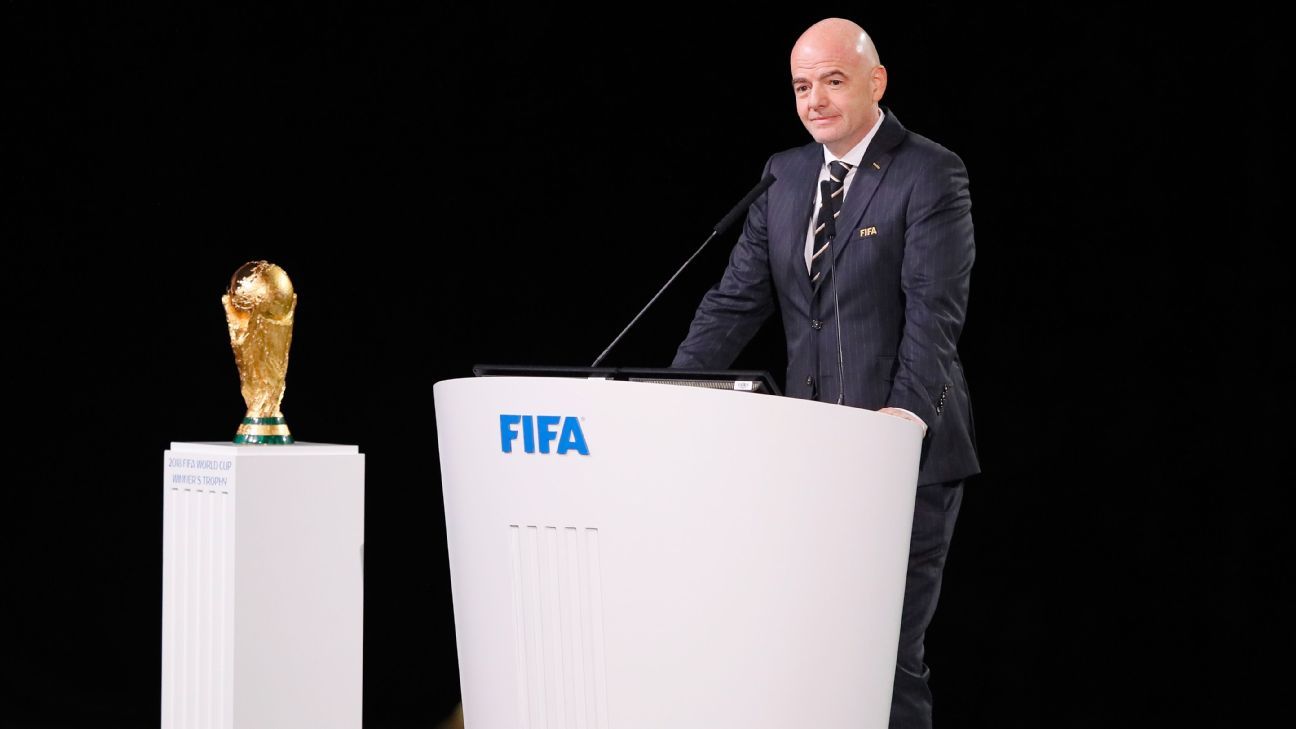FIFA is set to create dozens of new committees and expert panels, reversing a governance reform passed in 2016 when the world football body was in turmoil during corruption scandals.
FIFA’s plan to increase its number of standing committees from seven to 35 — with the option to let its president Gianni Infantino create and appoint extra panels of experts — was detailed in a draft update of its legal statutes released late Wednesday.
– Stream on ESPN+: LaLiga, Bundesliga, more (U.S.)
Creating the new bodies could let FIFA award hundreds of expenses-paid committee seats to football officials worldwide who will vote on the new rules at a May 17 meeting in Thailand. A similar system widely seen as patronage to encourage loyalty thrived in the presidency of Sepp Blatter who was ousted from office in 2015.
The American and Swiss federal investigations of international football, revealed in May 2015 by hotel and office raids in Zurich, led to a wide-ranging review of FIFA’s management structure and principles.
A 15-member review panel chaired by veteran Olympic lawyer François Carrard advised terminating most of FIFA’s 26 committees “to improve efficiency.” It also wanted to involve FIFA’s 200-plus member federations “in a more meaningful gender-balanced and efficient way in the decision-making processes of FIFA.”
The panel included Infantino, then general secretary of European football body UEFA, and its slate of reforms was passed at a FIFA congress in February 2016. On the same day Infantino was elected to lead FIFA.
The new slate of committees under article 39 of FIFA’s statutes being proposed to the next congress on May 17 in Bangkok, Thailand, includes a dedicated “Anti-Racism and Anti-Discrimination Committee.”
FIFA had a racism task force under Blatter which was shut down within months of Infantino taking over, saying its work was complete. A new anti-racism body has been worked on with Real Madrid‘s Brazilian forward Vinícius Júnior.
FIFA has just one committee overseeing organisation of its football tournaments, and this should increase to nine. They would include separate bodies for each of the national team, club and youth competitions for women.
There also would be separate men’s and women’s committees for issues involving players and coaches, plus a new fans committee, the FIFA draft statutes said.
The expansion is designed to “reflect the increasing breadth and depth of FIFA’s activities in recent years, allowing for more member associations to be directly involved in the democratic decision-making processes,” FIFA said.
Decision-making under Infantino has often been delegated to a panel he chairs with just the presidents of the six continental governing bodies, known as the FIFA bureau. Its decisions are rubber-stamped by the FIFA council, whose 37 members are each paid at least $250,000 plus expenses annually.
Adding more FIFA committees is the latest apparent drift away from the spirit of the Carrard-led group.
It said FIFA presidents should be capped at a maximum 12 years in office, but Infantino is on track to stay for 15. A statutes amendment after Infantino was elected meant finishing Blatter’s mandate from 2016-19 did not count against his limit.
Promoting women officials and tackling discrimination in football should also be strengthened by the latest FIFA statutes update. The draft proposal obliges the 211 national member federations to pursue those goals.
FIFA also advises members to include at least one woman in a delegation of three officials attending the annual congress.
FIFA is preparing to confirm the hosts of the 2030 and 2034 men’s World Cups at the same meeting later this year. That needs a legal tweak because of a rule passed after the controversial dual choice of 2018 host Russia and 2022 host Qatar on the same day in 2010.
The future hosts are effectively decided with one preferred candidate for each: Saudi Arabia in 2034 and the six-nation, three-continent proposal for 2030 of Spain, Portugal and Morocco with a single game each for Argentina, Paraguay and the inaugural 1930 World Cup host Uruguay.
When FIFA announced those preferences last October, it said final approval by members had to be made at separate meetings in late 2024.
Now FIFA proposes letting the council decide to award “hosting rights to more than one FIFA World Cup at the same FIFA congress.”
